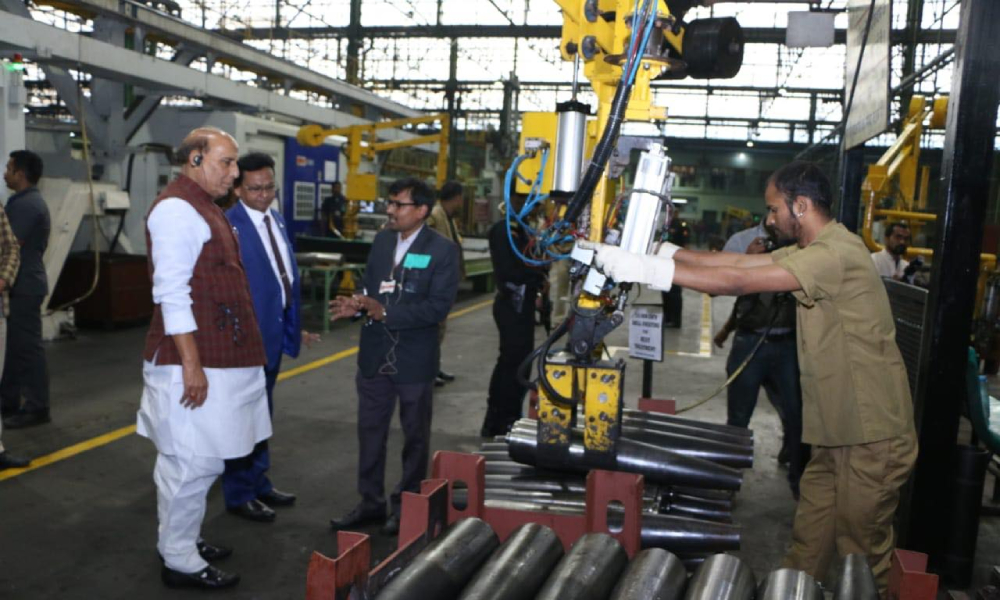
Image Credits: Facebook/ Rajnath Singh
246-Year -Old Ordnance Factory Board Scrapped By Centre, 70,000 Employees Promised Retirement Benefits
Writer: Anuran Sadhu
A post grad journalism student of SIMC, Pune with a passion for using words to get my message across in the most unique ways possible and curiosity is the force that drives me to learn and experience more every day.
India, 18 Jun 2021 9:23 AM GMT | Updated 18 Jun 2021 10:22 AM GMT
Editor : Ankita Singh |
A literature lover who likes delving deeper into a wide range of societal issues and expresses her opinions about the same. Keeps looking for best-read recommendations while enjoying her coffee and tea.
Creatives : Anuran Sadhu
A post grad journalism student of SIMC, Pune with a passion for using words to get my message across in the most unique ways possible and curiosity is the force that drives me to learn and experience more every day.
The Kolkata-based OBF, established by the British in 1775, will split up into seven separate companies, each taking up a specific manufacturing role.
In a major corporatisation move by the Union Cabinet, the 246-years old Ordnance Factory Board (OFB) will cease to exist. The Kolkata-based OBF, established by the British in 1775, will split up into seven separate companies, each taking up a specific manufacturing role.
Presently, 41 factories exist under OFB consisting of 11 ammunition and explosives factories, 10 weapons, vehicles and equipment factories, and 20 material and components, armoured vehicles and ordnance equipment factories. 18 of them were established by the British, and the remaining 23 came up after independence. These 41 factories will be merged and divided into seven new companies, all 100 per cent government-owned public sector undertakings (PSU).
The seven new entities are yet to be named, but they will include an 'ammunition and explosives group', a 'vehicles group', 'weapons and equipment group', 'troop comfort items group', 'ancillary group', 'optoelectronics group' and 'parachute group.'
Indian Armed Forces are the prime customers of the OFB. The factories provide arms, ammunition, clothing, bulletproof vehicles and mine protected vehicles to Central Paramilitary Forces, State Police Forces and others.
Why restructuring is required?
According to a 2018 report by the Comptroller and Auditor General (CAG), the factories continued to fail to meet the target production and had only achieved 49% of the targeted items in 2017-18. Delays and insufficient production are the primary reasons behind the restructuring of OFB. The overhaul aims to transform the OFB into a profitable, extend the product range, improve quality and make it more cost-efficient, as per The Tribune.
In 2019, the Ministry of Defense said in a press release that several high-level committees like TKA Nair Committee, Vijay Kelkar Committee had suggested converting the OFB into a corporate entity.
Reaction of the employees
The decision by the Centre to convert the OFB into seven defence public sector undertaking (DPSU) has been opposed by the federations of the ordnance factory. All India Defence Employees' Federation, Bhartiya Pratiraksha Mazdoor Sangh, and the Indian National Defence Workers' Federation will meet on Sunday, and a nationwide indefinite strike is on the cards.
"The entire government machinery has gone against the Ordnance Factories and its employee. The entire workforce of Ordnance Factories and the four lakh defence civilian employees reject the decision of the government," read a joint statement by the leaders of the federations, as per The Indian Express.
Government's response
On June 16, Defense Minister Rajnath Singh said, "I can assure the OFB employees (approx. 70,000) that their service conditions remain the same. The pensions and post-retirement benefits too shall remain the same."
He also assured that the transitional support and redeployment of the workers, besides safeguarding the wages and retirement benefits, will be taken care of by an Empowered Group of Ministers (EGoM), which the Defence Minister himself will head.
Also Read: Fresh List Of Defence Items For Import Embargro In March: Defence Minister Rajnath Singh
 All section
All section














